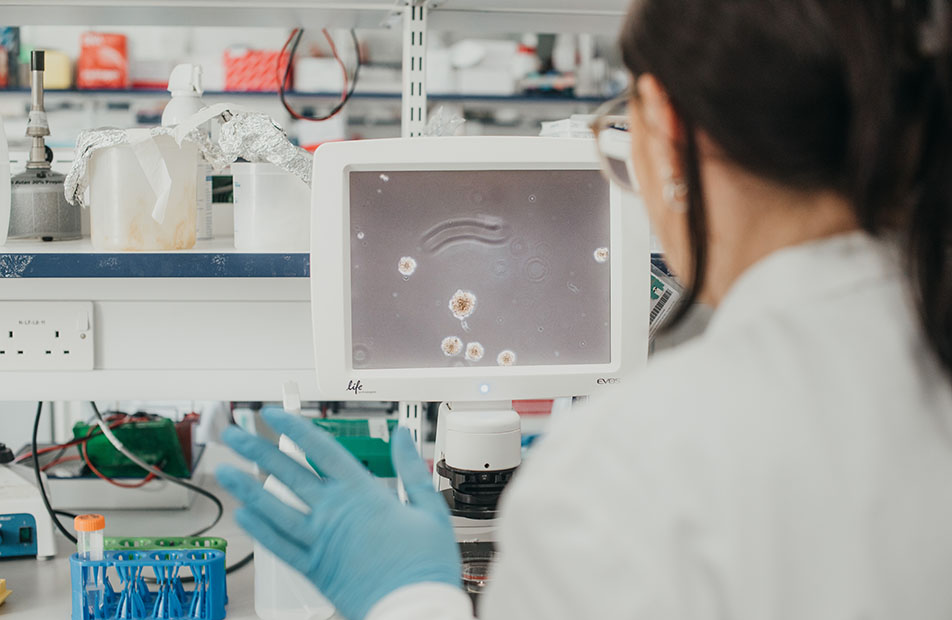
We’re investing over £2 million into four new research projects exploring creative approaches to improve beta cell therapies and tackle immune system dysfunction in type 1 diabetes.
The latest batch of cutting-edge projects are now underway thanks to funding from the Grand Challenge. This investment will help research teams across the UK to test their original and potentially groundbreaking ideas on ways to improve the function and survival of insulin-producing beta cells and keep the type 1 immune attack at bay. Together, these pioneering projects offer new hope to improve the lives of people with type 1 diabetes.
Tiny molecules with big potential
Dr Aida Martinez-Sanchez, Dr Prashant Srivastava and their team at Imperial College London, along with Dr Teresa Rodriguez-Calvo at Helmholtz Zentrum Munich, will study how microRNAs – tiny molecules in our cells that switch different genes on and off and change how the cell works – affect the function and survival of beta cells.
Dr Aida Martinez-Sanchez said:
“The complex methodologies we’re developing have the potential to form the basis of future research in other important aspects of beta cell biology, such as how to reduce the risk of transplant rejection, or delay or prevent beta cell destruction in type 1 diabetes.”
Read more about the team’s project.
Insulin on the brain to outsmart type 1
At the University of Exeter, a team led by Dr Craig Beall and Dr Thomas Piers will explore whether a type of brain cell that produces insulin can be used to develop long-lasting, effective beta cell therapies for type 1 diabetes which are resistant to the type 1 immune attack.
Dr Craig Beall said:
“The moonshot we’re aiming for is a cure that frees people with type 1 diabetes from insulin injections and immunosuppression, and this is the next step in that journey.”
Read more about the team’s project.
Developing drugs from bugs – how do beta cells tick?
Tick saliva contains peptides that helps to hide them from their victims’ immune systems. Researchers at the University of Oxford led by Professor Shoumo Bhattacharya and Professor David Hodson will harness these immune system evading peptides to develop beta cell therapies that are protected from the type 1 immune attack. This could transform the way the condition is treated by helping people to make their own insulin again without the need for immunosuppressive drugs.
Professor Shoumo Bhattacharya said:
“Our lab is looking to nature for new ways to treat inflammatory diseases. We aim to develop tick-inspired treatments to help people with type 1 diabetes, which could improve the success of beta cell transplants.”
Read more about the team’s project.
Could an existing medicine reverse the steps that lead to type 1 diabetes?
Professor Eoin McKinney and his team at the University of Cambridge will use genetic insights and powerful machine learning technology to identify and test new drug candidates for type 1 diabetes. The team has created detailed maps of immune cell changes in people at high risk of type 1, identifying specific genetic patterns, called signatures, that are only seen in those who develop the condition. Using these signatures, they now aim to understand the abnormal immune signals that lead to type 1 diabetes and find drugs to counter them, with the aim of preventing the condition from progressing.
Professor Eoin McKinney said:
“By selecting candidate treatments rationally based on a match with type 1 data, we will stand the best possible chance of finding a safe and effective approach to stop the condition with real impact for patients everywhere.”
Read more about the team’s project.
Dr Elizabeth Robertson, Director of Research at Diabetes UK, said:
“These high-risk, high-reward, innovative projects exemplify the transformative potential of the research funded by the Type 1 Diabetes Grand Challenge. By driving forward bold, cutting-edge approaches, we’re stepping closer to revolutionising the way type 1 diabetes is treated and improving the lives of those affected by the condition.”
Rachel Connor, Director of Research Partnerships at Breakthrough T1D UK, said:
“With these new projects the Type 1 Diabetes Grand Challenges is now funding a total of 19 innovative research studies, all driving us closer to transforming life for people type 1 diabetes. Each project takes a unique approach to the three challenges in type 1 diabetes that we’re tackling: replacing beta cells, uncovering the root causes of type 1, and developing the next generation of insulins.”
